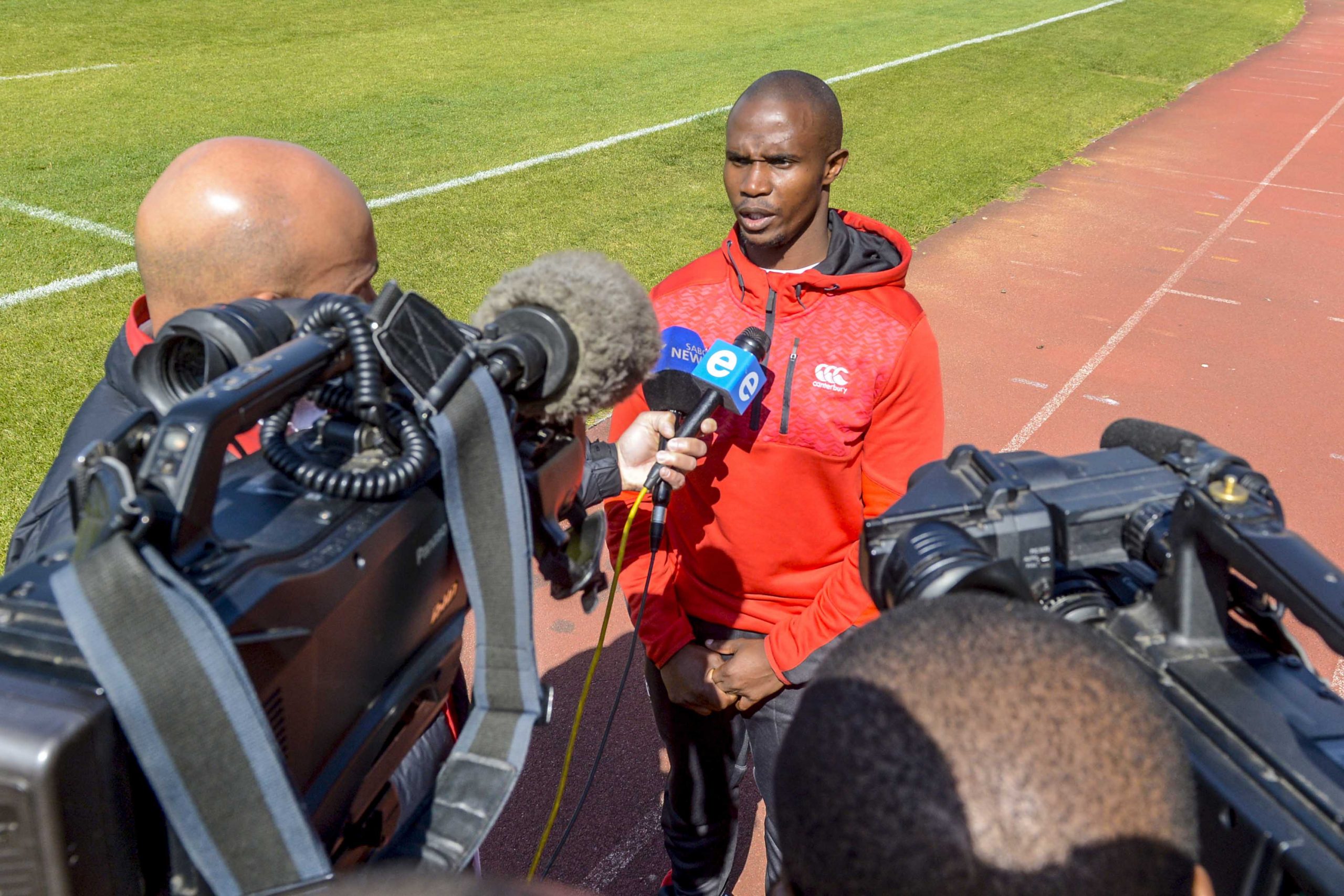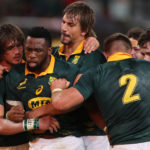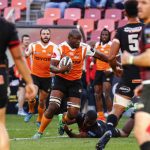South African rugby’s blackballed coaches
Despite the gains South Africa has made since apartheid ended officially in 1994, rugby has been slow to keep up with the times when it comes to appointing black coaches.
Author:
4 February 2019

Bevin Fortuin paints a picture of a lonely black kid, sitting in a classroom facing the wall like a dunce, complete with humiliating white cone hat, while being reprimanded for his skin colour. In South African coaching structures, it is assumed the black child isn’t equipped to handle the complicated stuff like the algebra and geometry of rugby.
If ever there was a metaphor that describes the role of black coaches in South African rugby, Fortuin’s is it. “The reality is that we are being called incompetent and we are constantly asked what the hell we know about rugby,” says Fortuin.
“People don’t trust us in head coaching positions. They see us just as assistant coaches. They do not see us as being good enough to lead a team from the top position. We are good enough to be club rugby coaches and [Currie Cup] First Division coaches. And even then, you are not immune to being mentioned as a quota appointment.”
Related article:
Fortuin was a mop-haired Free State Cheetahs fullback, an unmistakable character on the field. He scored the first of two tries at Loftus Versfeld in Pretoria against the Blue Bulls in 2005 to help Free State win its first Currie Cup title in 29 years. His rugby credentials are as deep as the Orange River. His two Springbok Test caps, a crying shame.
The 39-year-old former head coach of South Western Districts (SWD) Eagles boasts a CV that should make top unions and franchises salivate at the prospect of having him on their books. He has headed up the SWD Eagles twice and also served as the Bulls’ Under-21 backline coach. But the top unions have seemingly either not noticed or chosen not to notice.
The four South African rugby franchises – the Sharks, Stormers, Bulls and Lions – will begin the Super Rugby season in February with just three coaches of colour – and none of them as head coaches.
Related article:
Ricardo Laubscher (Sharks assistant coach), Joey Mongalo (Lions assistant coach) and Hayden Groepes (Bulls skills and kicking coach) have made the coaching roster. Assuming each franchise has five people assisting the head coach at close quarters – backline, forwards, defence, kicking and skills, technical/video analyst – that means 24 jobs, 21 of which are filled by white coaches. That’s 87.5% white, the inverse of the country’s demographics.
Despite the many black coaches that are doing visibly admirable work – such as Selborne College’s Phiwe Nomlomo, Southern Kings head coach Deon Davids, Kings backline coach Chumani Booi, Leopards head coach Jonathan Mokuena and Bok assistant coach Mzwandile Stick – the situation is getting worse.
A different festive season
December in the Eastern Cape marks the crescendo of festival activity. It is not uncommon to slug traditional beer and the accompanying slaughtered meat on a daily basis, veering from one initiation ceremony to the next before careening to a halt in January.
For former Cheetahs skills and backline coach, Sino Ganto, the time off meant something else. In the lead-up up to Christmas last year, he took promising Kings fly half and cousin Oliver Zono, Sharks junior scrum half Siba Mzanywa and young Western Province scrum half Lucky Dlepu to the University of Fort Hare grounds to work on skills and conditioning. While some of their contemporaries nursed hangovers, the four got to work on drills using balls and cones in the boiling, 35°C heat.
Related article:
It is the same ethos that coach Heyneke Meyer drilled into lock Victor Matfield to make him the line-out beast he became for the all-conquering Blue Bulls of the 2000s. Ganto gave the trio the same recipe that helped Stormers wing Sergeal Petersen stage his career comeback and make the Boks squad, former Springbok wing Raymond Rhule break into the Boks, centre Nico Lee make his breakthrough at the Cheetahs and prop Ox Nché become the most skilful Cheetahs forward since Springbok and Blue Bulls prop Trevor Nyakane.
“I’ve been doing this for years. I didn’t start when the boys were suddenly thrust into the spotlight,” says Ganto. “I try to help them out so that they understand when they go home in December, their ‘festive season’ and that of the other people must differ. I always tried to look at what’s hindering their progress when they get to their unions. I try to spot the things they don’t work on as much at their unions, especially on the skills side.”
While Meyer was lauded as a Loftus hero, in Bloemfontein, Ganto was vilified for being black and daring to look out for his own best interests. Fifteen days before his contract ended, he was told his services were no longer required after four years of toil and loyalty, a couple more if you include his playing days.
Junior Springbok call-up
Trouble started, it seems, when Ganto came close to coaching the Junior Springboks. The Cheetahs, who had promised over and over to promote him into the senior coaching team but reneged on their word, apparently didn’t like the fact that Ganto was garnering national recognition as a junior mentor. The union were happy, he says, to keep him as a junior assistant while they promoted less qualified coaches who had been there for a shorter time.
“I was supposed to join the SA Under-20s [on a part-time basis],” says Ganto. “I was talking to [Junior Springbok assistant coach] Louis Koen about the possibility. Louis wanted me to help him and tell him about the Under-19s that I was working with at the province. I would tell him the names of players to watch out for and what their strengths and weaknesses are.
“We were waiting for Rassie Erasmus [in his capacity as high performance manager] to give us the budget to my proposed role assisting Louis. A few days later, someone from the Cheetahs told me they were at SA Rugby in Cape Town and that SA Rugby were asking about me. They demanded that everything I do with SA Rugby go through the Cheetahs first, but I knew the history [of sabotage] at the union and I was reluctant to do that.
Related article:
“Little did I know that the person who was at SA Rugby went to Louis and said this guy [Ganto] is going to get a contract with us [Cheetahs]. But they knew that was not going to be the case. And after closing the opportunity at SA Rugby, they came back to me and told me I was not getting a new contract.”
It was a triple whammy. Without a job, without the new national opportunity and just 15 days to scramble for employment, Ganto felt the walls closing in.
“I accepted the fact that I did not get a contract, but they acted like cowards. I could have looked for opportunities at other unions if I’d known that I’m not part of their plans. They wasted so much time.
“And this came after the fact that I would never have survived on my Cheetahs salary alone in Bloemfontein. You have to be out there looking for sponsors as well. If it wasn’t for Ford and Nike, whom I am associated with, I would have struggled. We have to patch here and there. I have a sister in boarding school, cousins to support whose parents passed away and all that. They don’t care about that.”
The Cheetahs’ side of the story
Free State holds a different view. After offering Ganto an undefined management position – which Ganto turned down because his passion lay with on-field work rather than off-field – the union said it was forced to let him go because SA Rugby had scrapped the domestic Under-19 and Under-21 competitions in favour of a conjoined Under-20 tournament. His position was therefore redundant, they say.
“As Saru [South African Rugby] cancelled the Under-19 rugby competition as from 2019, the Toyota Cheetahs could not continue with any of the contracts of the Under-19 coaching staff. Those would be the head coach, assistant coach [Ganto] and the backline coach. Two of these coaches are white,” Cheetahs spokesperson Ronel Pienaar said when asked about the reasons Ganto was let go.
“To assist Sino and show courtesy towards him in particular, we extended his contract with two months until 31 December 2018, to afford him time to find other opportunities in the rugby industry. This unfortunate situation also occurred at the other franchises and affected coaches and players throughout the system. The season before last, he was offered a managerial position to extend his skill set and offer him more opportunities, which he unfortunately declined. In the meantime, that position was filled.”
Ganto is not the only one fighting personal fires. Legendary coach Paul Treu’s future at Western Province Rugby Union has been the talk of the town for the past year. Treu was taken to task for insubordination after offering a differing opinion to that of Stormers head coach Robbie Fleck. Never mind that Treu’s coaching record far exceeds Fleck’s, the latter wanted the assistance of yes men to tank the Stormers’ Super Rugby prospects, without the annoying expert advice of an experienced coach as a voice of reason amid the madness.
Historical injustice
Treu submitted a 26-page list of grievances to the independent law firm hired to determine if discrimination was at play in the saga. The law firm found no discrimination and Treu was not welcome to return to the coaching setup, and a possible move to a managerial role is now the subject of a new saga involving Stormers players and sponsors.
“There is a widespread belief that white coaches will give you a better probability for success. And they are not even successful, they are failing,” said a former national rugby coach who spoke on condition of anonymity.
“If you’re coloured, you probably have a better chance of becoming the next Springbok coach. Ethnic black coaches have never been given that opportunity. They just circulate the same type of coaches and maintain the same white supremacy that exists in rugby coaching.”
Related article:
Thelo Wakefield, who was Western Province’s outgoing president when the Treu saga ignited, agreed that there was a historical injustice that prejudiced black coaches in South African rugby.
“We got the opportunity to participate fully on the national rugby radar 27 years ago and isn’t it shocking that in 2019 we are only capable of producing three [assistant] coaches in Super Rugby? One can’t even count them on one hand,” he says. “It is an area where we still have very little confidence in African black coaches. We put icing on a bad cake in the days after apartheid ended. There was no development, only separatism.
“Aside from Allister Coetzee [and Peter de Villiers], we haven’t brought black coaches through to be in charge of top teams. When do you stop being a development coach or a development player? When do you stop being a quota? When do stop being an assistant?”
Missed opportunity
The issue of transformation (or lack thereof) in rugby coaching goes deeper than just the numbers and a black breadwinner suddenly made to walk the plank. It is symptomatic of a South African society that sees white as right and black as whack when it comes to top leadership posts.
Blacks are viewed as needing their hands held, while whites are considered innate leaders. The result is that it could be a decade or more before another black Springbok coach is appointed, judging by the fact that Deon Davids (Southern Kings) is the only black head coach of a South African franchise.
Towards the end of last year, Davids was one of three frontrunners for the Bulls top job, alongside Matfield and Pote Human. Davids lost out to 59-year-old Human, the singular most backward step in South African rugby in a quarter of a century.
“The Bulls had the perfect opportunity to change the complexion of South African rugby forever,” Fortuin says adroitly. “I know there would have been a lot of Bulls fans who would have moved out of Pretoria in protest, but that was the best opportunity for rugby in South Africa to showcase another side.”
Achilles heel
Alfred Mzizi, one of the early victims of the black coach cull that happens at assistant level, called for a policy to police coaching appointments in rugby.
Mzizi assisted Meyer at the Bulls in the 1990s and was tutored by Nick Mallett and Alan Solomons at Bok level, yet was guillotined in the same way as other black African coaches who flew too close to the sun: David Maidza, Dumisani Mhani, Norman Mbiko, David Dobela and Humphrey Nojoko.
The Achilles heel of SA Rugby lies in the reality that the mother body has no jurisdiction over its unions and franchises, and this is the biggest stumbling block to transformation.
Related article:
“My view is that the old [apartheid] law that stipulated the Jobs Reservation Act, which said that certain jobs were for white people and others for black people, still exists in rugby today,” Mzizi says. “The Bulls wanted someone who knows the Bulls’ ‘culture’. And once people start talking about culture, if ungum’Cirha emaQwathini [you are of the Cirha Clan in a Qwathi Clan environment], you are finished. That prerequisite makes it impossible for you to contest for the position.”
The late Nelie Smith once handed Coetzee the reins of the Eastern Province Elephants, making him head coach in the late 1990s. It was a coronation that made him the first black rugby coach in the professional era.
Since then, black coaches have lived a transient existence, taking a begging bowl from one union to the next. Instead of being the high point for change, the appointments of Coetzee and De Villiers to the top Bok job seem to be the only exceptions to the Slegs Blankes (Whites Only) sign on the door in the past 28 years, with no signs of change in the near future.
This story has been amended to correct an earlier factual mistake, Fortuin scored the first rather than the winning try and is the former head coach of SWD.






